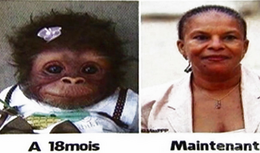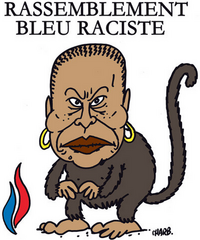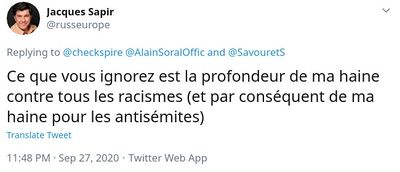Freedom of speech
m |
m |
||
| Line 56: | Line 56: | ||
People who want to repress freedom of speech often do so to fight hatred. Often, they themselves also hate acutely those whose hate they want to silence. | People who want to repress freedom of speech often do so to fight hatred. Often, they themselves also hate acutely those whose hate they want to silence. | ||
| − | This economist, Jacques Sapir, hates racists and for those who deny genocides, he recommends, if not jail, then to | + | This economist, [https://en.wikipedia.org/wiki/Jacques_Sapir Jacques Sapir], hates racists and for those who deny genocides, he recommends, if not jail, then to shoot them. Shooting all people who share an identity (in this case, deniers) is in itself, a genocide. |
<center><wz tip="What you ignore is my deep hatred against all forms of racism (and consequently my hatres for antisemites).">[[File:Screenshot_28-09-2020_193458.jpg|400px]]</wz></center><center><wz tip="For what concerns negation of genocide (of Jews, of Armenians, of Hereros) if not jail then twelves bullets in their skin.">[[File:Screenshot_28-09-2020_193545.jpg|400px]]</wz></center> | <center><wz tip="What you ignore is my deep hatred against all forms of racism (and consequently my hatres for antisemites).">[[File:Screenshot_28-09-2020_193458.jpg|400px]]</wz></center><center><wz tip="For what concerns negation of genocide (of Jews, of Armenians, of Hereros) if not jail then twelves bullets in their skin.">[[File:Screenshot_28-09-2020_193545.jpg|400px]]</wz></center> | ||
Latest revision as of 17:55, 28 September 2020
Talleyrand.
I am in favor of complete, full, unrestrained freedom of speech, with no limits whatsoever.
This means indeed that people should have the right to be racists, to be insulting, to be denying scientific, historical or whatever facts, regardless of how firmly established or sensitive they are. People should be allowed to libel, to lie, to verbally attack other people because of their ethnicity, their belonging—or not belonging—to a nation, a race, a religion, a sex, or a sexual orientation, or because they have a handicap, they should be allowed to call to murder individuals or to call for genocides.
As Chomsky pointed out (when personally attacked to defend someone's free speech), the distinction between supporting someone's right to free speech and supporting whatever is being expressed has been well understood since the 18th century.
Thus, I am not saying that while people should have this right, they should exert it. Ideally, our society does evolve into one where such archaisms do fade away, although. I am not defending people's right to, say, racial slurs because I am a racist and want to enjoy this right myself (the same applies to, as far as I can tell, all the terrible offenses I listed above).
Precisely because I think racism is obnoxious, it should be fought by letting racists people speak. This is protecting the racist to prevent them from openly speaking their mind.
It also allows to fight not merely the racists but beyond that, racism itself, because everything that is wrong is based on mediocrity, on ignorance and stupidity, and these are fought by the verb, by the debate, by the free expression, not by legal rules.
Finally, there remains the difficulty in drawing the line between what is acceptable and not. The more fuzzy is the boundary, the more offenses will be committed, which shows that legal repression is an unstable process. Letting people speak will foster the establishment of self-imposed boundaries, that can, indeed, that will evolve with times.
Many a defender of a free-speech state that they are in favor "except for..." and then typically come some personal sensibilities, such as "racism", "incitement to violence", "libel", "insults", etc. Of course this is self-defeating because in the ellipses one can coin in whatever they wish to censor, reshaped in a form that makes it falling in one or various of the exception categories. A sure sign that this treatment accommodating for exceptions is fundamentally biased is that also the biggest enemies of free speech say the same thing, "agreed, except for..."
So while it does not work if there is a restrain, however small, however innocuous, let us try to imagine the drawbacks of such an absolutist point of view.
What if I insult someone and this causes personal harm to this person, a psychological stress or anguish or public humiliation?
In such a case, either my insult is groundless, and the public will judge me for what I am, a pathetic, rude and vulgar person. As demolished already in the Antiquity (by Aristophanes), not by legal strike back but precisely by great speech, To be insulted by you is to be garlanded with lilies.
Either the insult targets something that is legitimate of causing the degradation in the first place, in which case it is just right to be expressed. If I say to a quant that he or she is a rogue and an embezzler, a disgrace for humanity, a modern slave tradesman and possibly accompanying this with more conventional expletives, I probably am merely expressing an insult that simply caresses the truth.
Most of the time, a fraction of people will think one way, another the other, and others will not care or understand. Why should it be for law to decide?
Which legal system is to set boundaries to when an insult is, in fact, deserved, and when it is unjust and plain pathetic? In no case, however, should the actual be authorized and left unpunished. Freedom of expression limits to freedom of verbal expression.
What if I make something up that causes factual harm? Say I produce false information, I invent stories that cause you a prejudice, I defame you?
To start with, since freedom of speech applies both ways, you have the possibility to produce counter-information and to defend yourself. Since I believe truth always win, ultimately, it is better to leave facts and time protect the innocent rather than a legal system, which, again, is much less reliable than truth itself. The libeler will soon be uncovered for what they are, lose their reputation and fail to impact with a free speech that they will have doomed into a worthless and inaudible one. They may still exert some influence on some reduced audience, but if someone is disposed to be likewise impressed, is that not because this is what they want to hear in the first place? In which case, law will not protect them, it will merely censor them.
What if someone calls for a criminal action, that later turns to reality because it incited a third party? Then the offender should be punished, because while it is impossible to draw a line between what is acceptable or not when it is said, or meant, or implied, it is on the other hand very easy to distinguish what is acceptable from what is not in the facts.
There is no second degree in killing. There is no doubt whether a criminal assault was meant as a joke, it is rarely acceptable to initiate violence, to cause physical harm to someone, not even to shout (including nice things), and instances that could be discussed, should be in the courtroom, but only when they entered the arena of actual action.
So if I call for the murder of someone, and that someone else actually performs the deed, I should still be free of exerting my free speech, which includes calling for more, or congratulating the criminal, whom, in turn, should be handed over to the judgement of the law and punished to whichever extent it provides for. Then I can be, of course, criticized, attacked (verbally), insulted, reproached in all the possible ways of the verb, because freedom of speech goes in all directions, but I cannot be condemned for a statement. However odious, hateful, however subversive, however impacting on a fragile audience.
First reason is that it is impossible to decide what is generally acceptable, what is borderline, what is first degree and what is actually denouncing what it is stating. Many defend themselves after having uttered obnoxious statements by saying they were precisely making a caricature to attack what others understood as advertised. In some cases, it could even be true. History shows us how movable is this frontier between what is acceptable and what is not.
Second reason is that .


Let us take as an example, child sexual abuse, possibly the most odious crime. How should society cope with freedom of speech in such a case? Should it be tolerated that someone makes the case in favor for ?
Below I list cases in France, documented on the Wikipedia:
People who want to repress freedom of speech often do so to fight hatred. Often, they themselves also hate acutely those whose hate they want to silence.
This economist, Jacques Sapir, hates racists and for those who deny genocides, he recommends, if not jail, then to shoot them. Shooting all people who share an identity (in this case, deniers) is in itself, a genocide.


Contents |
Condemned but
- In 1994, the newspaper Le quotidien de Paris published the article L'obscurité de l'erreur by journalist, sociologist, and historian Paul Giniewski. The article was a reaction to the publication of the papal encyclical Veritatis Splendor. In the article, Giniewski criticizes the Pope, and states that Catholic doctrine abetted the conception and the realization of Auschwitz. A Catholic organization initiated criminal proceedings on the ground that the article was an insult to a group because of its religion. The court of first instance convicted the newspaper, but the first court of appeal annulled the conviction. The Catholic organization launched a civil action. The court of first instance decided that the article constituted a defamation of Catholics. The first court of appeal disagreed. The Supreme Court of Appeal held that the first court of appeal had made an error, and referred the matter back to that court. The first court of appeal then held Giniewski liable for defaming Catholics. Giniewski appealed, but the Supreme Court of Appeal rejected his contention that his aim was not to insult Catholics but to present an opinion in good faith. Giniewski appealed to the European Court of Human Rights. The European Court held that the courts of France were wrong.
- In March 2005, Marithé François Girbaud, a brand of women's clothing, had a billboard—40 metres long—placed on a building on the Avenue Charles-de-Gaulle in Neuilly-sur-Seine. The billboard featured a photograph of twelve beautiful, well-dressed women and one shirtless man posed round a table in the manner of the characters in the painting Last Supper by Leonardo da Vinci. A Catholic organization complained that the billboard insulted a group of people because of their religion. The court of first instance convicted Girbaud, and ordered the billboard removed. In April 2005, a higher court upheld the conviction. In November 2006, the Supreme Court of Appeal annulled the conviction.
- In 2005, the organization Aides Haute-Garonne organized La nuit de la Sainte-Capote (the night of the Holy Condom), an informative evening about the prevention of the human immunodeficiency virus. To announce the event, the organization handed out a prospectus. The prospectus contained a head-and-shoulders image of a woman wearing a nun's bonnet. Near that image was the image of two pink condoms. The prospectus's text asked for the protection of Sainte Capote. A Catholic organization initiated proceedings on the ground that the prospectus insulted a group because of its religion. The court of first instance convicted Aides Haute-Garonne. The first court of appeal, the Court of Toulouse, upheld the conviction. In February 2006, the Supreme Court of Appeal annulled the conviction.
Condemned
- In 1984, a judge prohibited a poster that advertised the film Ave Maria by Jacques Richard. The poster showed a young woman, covered only at the waist, with her arms and feet tied to a cross.
- On 18 January 2007, a tribunal in Lyon sentenced Bruno Gollnisch to a three-month, suspended prison-term and a fine of €5,000 for the offense of contesting information about the Holocaust. The court also ordered him to pay €55,000 euros in damages to the plaintiffs and to pay for the judgment to be published in the newspapers that originally printed his remarks.
- In 2008, legendary French actress Brigitte Bardot was convicted for the fifth time for inciting hatred. The Movement Against Racism and for Friendship between Peoples (MRAP) filed the charge against Bardot because, in a letter to the government about the Muslim festival of Eid-al-Kabir, she complained about "this population that leads us around by the nose, [and] which destroys our country."
Unclear
- In 2007, the Supreme Court of Appeal considered a remark by a comedian during an interview published in the journal Lyon Capitale. The comedian said that Jews were a sect, a fraud. The court said the remark was an insult to a group defined by their place of origin.
- In 2013 Bob Dylan was placed under judicial investigation in France for allegedly provoking ethnic hatred of Croats. It followed a legal complaint lodged by a Croat association in France over a 2012 interview Dylan gave to Rolling Stone magazine.